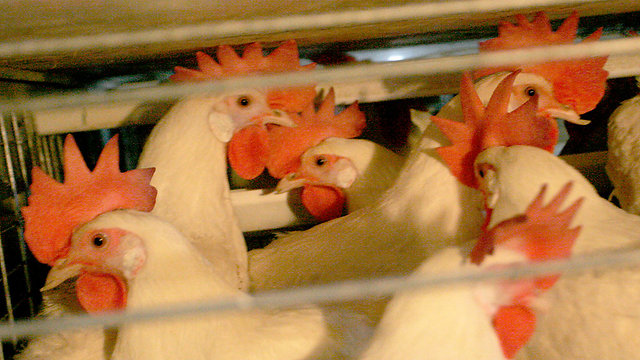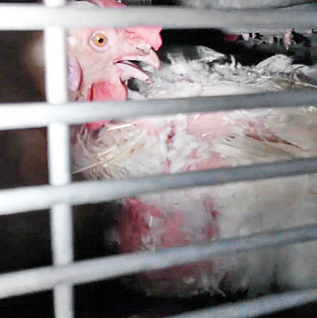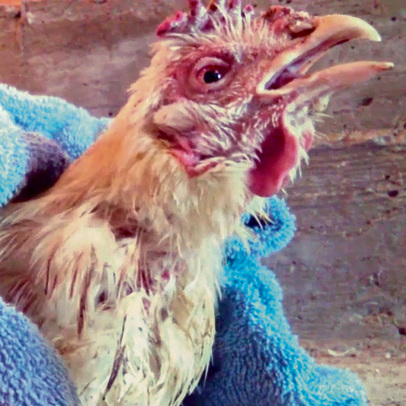For an entire year, ‘G’ documented the severe abuse of birds that regularly take place at Milouoff, until he could no longer take it. Milouoff: ‘This is an unusual and severe case. The manager has since been fired.’
For an entire year—12 months, 365 days—G (an alias) worked in breeding coops belonging to the poultry supply company Milouoff, where he faced daily, ultimately unbearable, and needless cases of animal abuse. The way the other workers treated the animals was shocking and seemed devoid of any training, compassion or veterinary care. Yet instead of quitting, G decided to try to change the current work practices and document what was being done in the coops. The following photos are hard to see: they include sick and bleeding birds, workers who kick them and break their necks with sticks, and a long, torturous dying process. The cruelty and suffering take place all the way to your dinner plate.
G passed his documentation over to animal-rights organization Anonymous, where it was met with shock and disbelief. Last December, the practices at Milouoff’s slaughterhouses and packing factories was at the center of an exposé that found problematic procedures dealing with product safety and veterinary oversight.
According to the company’s website, Milouoff produces 50,000 tons of product every year and constitutes 12% of the market. Some 600 employees work at the company, and roughly 90,000 birds are processed every day through four product lines operating throughout the country. G worked on a farm that holds over 10,000 birds at any given moment, that are kept there to lay eggs and help them hatch.

‘You just take them out of the coop and throw them out’
“The farm where I worked was a breeding coop operating as a hatching facility for chicks that will eventually go to chicken slaughterhouses,” said G. The birds remain in the breeding coop for roughly ten months, during which they become weaker as their physical health deteriorates. Our daily routine would begin with supplying them food and collecting the eggs and bodies of the chickens that had died. Mortality was a daily occurrence there.
“I started looking into the different procedures on the farm. Since the death pits were relatively far, you didn’t go there every time you took out a sick or dead chicken, so the common procedure was to place them in a wheelbarrow that is only emptied at the end of the day. There were countless times when I saw live birds taken out of the coop for being injured, too weak or if they had stopped laying eggs. They would lie in that wheelbarrow for hours, in the rain or under the blazing sun, and every so often, the cats would come and try to snatch them.”
Did you receive any professional training before beginning the job? Did your coworkers receive any professional training on how to treat animals?
“No. The managers took part in various education programs, but ground-level workers, be they Israeli, Thai or Nepalese, didn’t receive training, apart from the guidance of the more experienced workers.”
What about the veterinary treatment administered to sick or injured birds?

“There was no such thing. The place itself is sealed off to protect against infection. The breeding coops are off-limits for everyone apart from the workers. When a veterinarian comes, the birds are brought to them. I’ve never seen any veterinary treatment carried out at an animal hospital; that was just a joke of sorts among those working there.”
In a video that G filmed, one of G’s supervisors is clearly heard telling him that birds that do not lay eggs belong in the death pit. “We come across a lot of infections and diseases among chickens that live on top of their fecal matter,” said G. “We often see feet swollen from infection to the point that the chicken begins to limp or even can no longer stand. When I asked about veterinary care and solutions for dealing with these cases, the answer I was given by a Milouoff inspector was that chickens in these conditions should be removed from the coop and thrown in the trash so as not to infect the other chickens. This doesn’t really offer any sort of a solution, since both the sick and healthy birds stand, sleep and roll around in the slop and fecal matter produced by one another. The coop is only cleaned after they have been slaughtered.”
How did the other employees react to your requests to treat the birds differently?
“At first, the relationships with my coworkers were very good, but after they noticed I was recording things, asking questions and confronting the management, it led to our own confrontations. They didn’t understand why I was doing these things and would ask me questions. After I explained my intentions and motivations, they began to hesitate when assigned to work with me, and eventually some even began to threaten me. The general feeling was that those in charge refrained from giving almost any guidance and instructions regarding awareness of animal cruelty or treating sick or injured birds. As a result, each worker dealt with these cases as they saw fit, which meant that the birds were killed in different ways.
“A worker might attempt to snap the head of a sick chicken using a wooden plank or pipe or throw it in the wheelbarrow where it would die sometime during the day, while those that survived that would be thrown alive into the death pit. It’s all up to the worker’s discretion and the knowledge they have already accumulated. Such situations are not uncommon within industrialized coops. One of the most frequent explanations I was given to this was ‘Ask anyone working at another farm; this is how everyone does it.’”
According to the Central Bureau of Statistics, the average Israeli consumes roughly 72 kg of meat a year, with an average of 1.38 kg per week. Seventy-eight percent of the overall meat consumed is poultry, with an average of 53 kg per person a year and one kg per week. The other 22% includes fish, beef and sheep meat. All in all, the Israeli coop industry is estimated to produce 5.5 billion shekels’ ($144 millions’) worth of product, which amount to 17% of Israel’s overall farming production.

‘Why do you think the price of schnitzel is so low?’
The 2015 state comptroller report clearly states that the poultry coop industry must become more efficient, which includes substantially improving the well-being of the birds. The report stresses, “The Ministry of Agriculture and the available veterinary services must use any available means to improve the biological safety of the birds and the quality of the eggs, as public health concerns.” It continues, “The evidence in the report shows a variety of deficiencies in the coop industry. The government must urgently take action to implement the coop improvement program set forth to bring about several goals, including a reorganization of the industry, a substantial improvement in the quality of its products and the protection of public health, improving the health of the animals along with preventing nuisances and infections, and a vast improvement in the birds’ well-being.”
G shared that he discovered that chickens feel pain. “They would screech and try to wiggle free,” he said. “Their breathing would become fast. At times they would freeze out of terror, and in cases of an illness or a continued injury, they would gradually become apathetic. When they became weak, they would huddle in the corner for days without eating, drinking or even getting up.”
Among other things, G documented how the coops are cleared out, when ten-month-old birds whose egg laying capabilities have been exhausted are taken to be slaughtered. “Nothing prepared me for the evacuation day,” he said. “The crew that arrived that night was made up of a group of young guys and three older workers. The general attitude was that of a blitz: You enter the coop and start spurring the birds toward the doors on the sides of the structure by any available scare tactic, including kicking. Sometimes they would just close the moving partitions on them, breaking dozens of legs, wings and necks, with all the birds stuffed in a small space near the entrance. They would then completely darken the coop, open the doors, and by the light of the moon begin stuffing them into the transport cages. That was all routine, with the workers bragging about how quick and efficient they were. This went on for several hours, during which the birds remained in the coop, completely terrified, while the others waited on the truck for hours. When they would finally leave, a horrifying silence would descend on the place. I walked into the empty coops and saw the piles of broken, dead bodies that were left behind.”
“My personal experience was that of growing frustration. I witnessed the birds’ suffering on a daily basis, I couldn’t do anything to help them, and the responses I got from the owners were of anger and threatening to fire me. I feel like people aren’t aware of what happens behind closed doors, and of the agony these animals have to go through in this industry.”
D, who is a senior employee in the same industry, does not understand why G’s video and photos are problematic. “If people want to believe that anyone raises chickens for breeding, eggs or meat under the same conditions they raise their pets, more power to them,” he said. “This is an industry whose goal is to maximize efficiency in a minimal amount of time. Why do you think the price of schnitzel is so low? Everything shown here is common work practices. It’s true that it isn’t pleasant to look at, but that’s how it is.”
When approached for a response, Milouoff issued a statement: “This is an unusual and severe case that took place on Yasur Farm in November 2015. The farm manager has since been fired, on that same day. It should be stressed that this incident does not reflect company policy and practices and that we take this very seriously. Our breeding coops are managed in accordance with the Animal Welfare Law and even beyond it, as we consider maintaining the health of the birds to be extremely important. All of our farm managers have been trained in the prevention of animal cruelty and receive clear and continuous instructions on how to care for the birds. We make it a point to follow any and all stipulations of the law. There is no place for any employee or manager who acts inappropriately and against company standards or the Animal Welfare Law. Such an employee will immediately be terminated.”
The Ministry of Agriculture also responded: “The ministry finds caring for animals’ well-being according to regulations and the Animal Welfare Law to be incredibly important. (To that end,) it will work to set up surveillance cameras. Any violation of the law or of regulations is taken extremely seriously by the ministry, and the public is encouraged to continue to report any suspicions they might have on such matters via e-mail to: [email protected].”
As reported by Ynetnews
